《PEP人教版小学英语》全部话题列表
- 格式:doc
- 大小:83.00 KB
- 文档页数:3
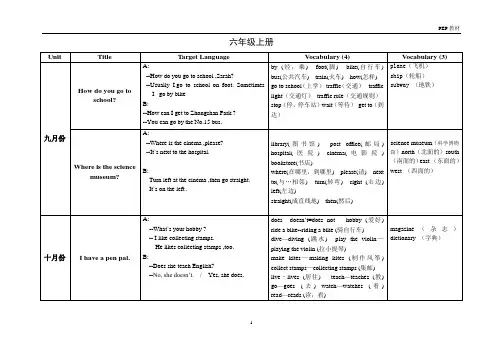

人教版 PEP小学英语教材知识梳理(3-6 年级)小学英语三年级上册教材梳理1. Key words of each unit:Unit Topic Key words (三会)四会U 1Greetings ruler, pencil, eraser, crayon, bag pen, pencil box, book.bagU 2Colours red, green, yellow, blue, black, brown, white, orange.redU 3Body face, ear, eye,nose, mouth,arm, hand, head, body leg, foot.noseU 4Animals duck, pig, cat, bear, dog, elephant, monkey, bird, tiger,pigpanda, zooU5Food bread, juice, egg, milk, water, cake, fish, rice.cakeU 6birthday one, two, three, four, five, six, seven, eight, nine, ten.four2. Main sentences in the text.Unit Topic Sentences备注:红色的句子建议指导U 1Greetings Hello, I ’m Wu Yifan./Hi, I’m Sarah.孩子进行简单的书空,有能I have a ruler/an eraser.力的学生可以练习书写,培What ’s your name /My name’s John.养学生的对句子的书写习惯Goodbye!/Bye, Miss White.和意识。
并且这些句子要进U 2Colours Mr Jones, this is Miss Green.行替换性练习和造句。
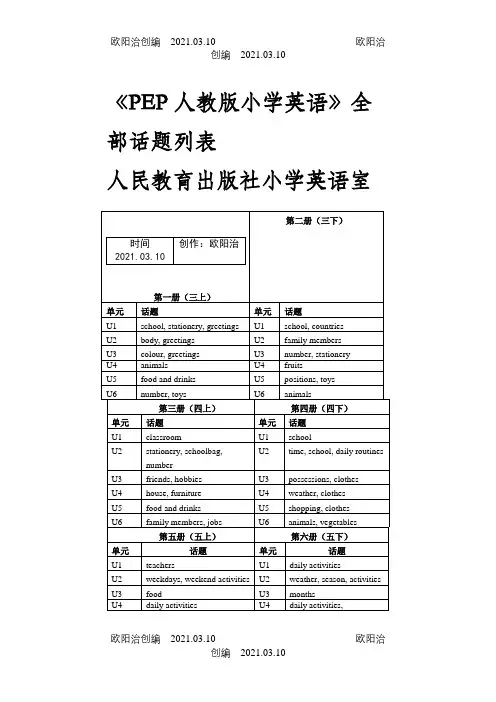
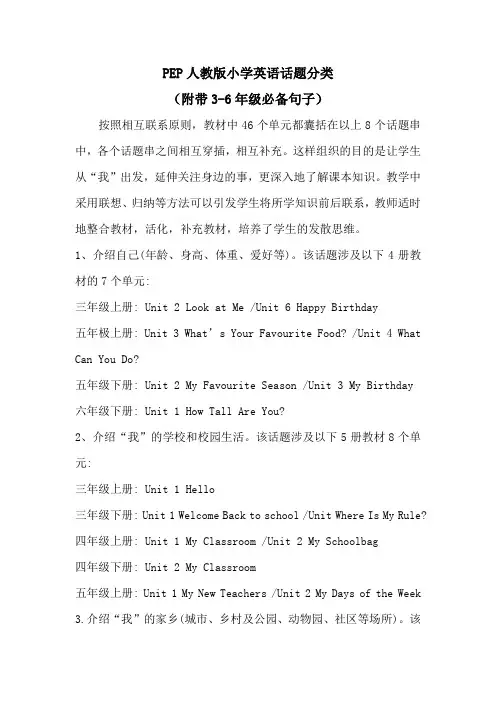
PEP人教版小学英语话题分类(附带3-6年级必备句子)按照相互联系原则,教材中46个单元都囊括在以上8个话题串中,各个话题串之间相互穿插,相互补充。
这样组织的目的是让学生从“我”出发,延伸关注身边的事,更深入地了解课本知识。
教学中采用联想、归纳等方法可以引发学生将所学知识前后联系,教师适时地整合教材,活化,补充教材,培养了学生的发散思维。
1、介绍自己(年龄、身高、体重、爱好等)。
该话题涉及以下4册教材的7个单元:三年级上册: Unit 2 Look at Me /Unit 6 Happy Birthday五年极上册: Unit 3 W hat’s Your Favourite Food? /Unit 4 What Can You Do?五年级下册: Unit 2 My Favourite Season /Unit 3 My Birthday 六年级下册: Unit 1 How Tall Are You?2、介绍“我”的学校和校园生活。
该话题涉及以下5册教材8个单元:三年级上册: Unit 1 Hello三年级下册: Unit 1 Welcome Back to school /Unit Where Is My Rule?四年级上册: Unit 1 My Classroom /Unit 2 My Schoolbag四年级下册: Unit 2 My Classroom五年级上册: Unit 1 My New Teachers /Unit 2 My Days of the Week 3.介绍“我”的家乡(城市、乡村及公园、动物园、社区等场所)。
该话题涉及以下5册教材的7个单元:三年级上册: Unit 4 We Love Animals三年级下册:Unit 3 How Many? / Unit 6 At the Zoo五年级上册: Unit 6 In a Nature Park五年级下册:Unit 3 Look at the monkeys六年级上册: Unit 1 How Do You Go There?/Unit 2 Where Is the Science Museum?4、介绍“我”的家(家庭、家人、家人职业和“我"的房间)。

小学英语话题HEN system office room 【HEN16H-HENS2AHENS8Q8-HENH1688】小学英语的十二个基本话题(上)话题一个人情况(Personal information)能够向他人介绍个人的基本情况(姓名、年龄、出生日期、家庭成员、电话号码、爱好、邮箱地址、外貌特征和自己的生活情况等),并能够写出自己简单的基本情况。
能够听懂他人的有关个人信息,并且记录简单信息。
话题二家庭(Family and home)能够介绍家庭成员(姓名、年龄、职业、外貌特征、爱好等)的基本信息。
能够利用所学的语言,互相询问有关对方家庭的基本情况。
能够简单地写出家庭成员的基本信息。
能够介绍家庭住房的各种房间的名称,并能简单描述部分室内的物品。
能够简单介绍家庭成员平时经常在这些房间做的事情。
尝试着设计自己梦想中的卧室,调查同学家里房间的拥有情况。
话题三学校(School life)能够介绍自己的学校生活(学校名称、任课教师、专业教室的名称等)。
能够介绍自己的学习科目,喜欢和不喜欢的科目,并能简单单说明理由。
能够向他人介绍自己的课程表,并设计自己喜欢的课程表。
话题四朋友(Friends)能够简单介绍自己的朋友(姓名、年龄、外貌特征、爱好等)。
能够简单地写出朋友的主要信息。
话题五天气(Weather)能够谈论有关天气情况。
能够听懂简单的天气预报,并记录相关的信息。
能够根据天气情况,设计自己的活动计划(合适的着装、活动去向、活动目的等)。
话题六饮食(Food and drink)能够表达自己喜欢和不喜欢的食物,并简单说明理由。
能够简单介绍自己一日三餐的饮食。
能够根据自己的喜好,为自己或他人点餐。
知道什么是良好的饮食习惯。
初步了解中西方关于饮食文化的差异。
话题七动物(Animals)能够表达自己喜欢和不喜欢的动物,并说出为什么。
能够描述动物的外貌特征以及它们的习性。
话题八购物(Shopping)能够询问物品的价格。
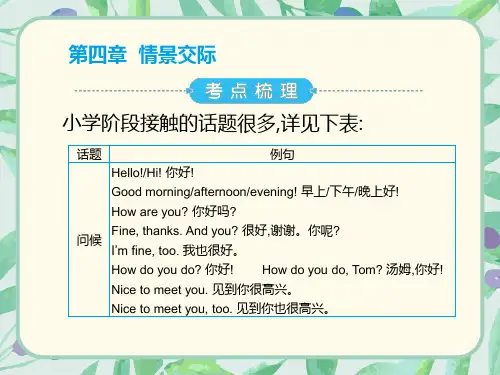
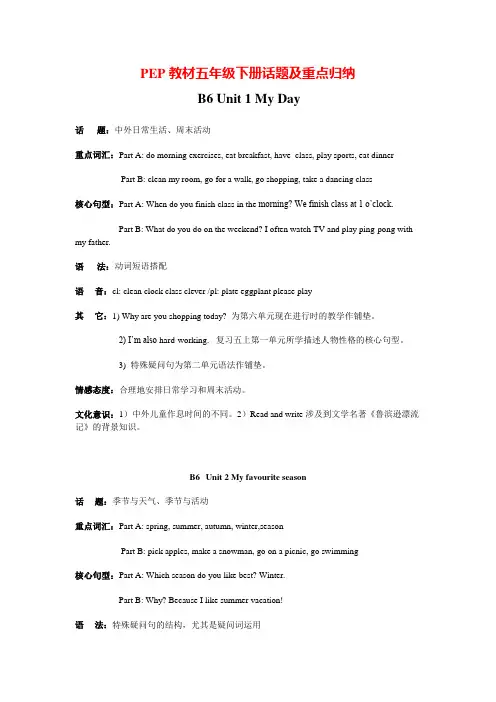
PEP教材五年级下册话题及重点归纳B6 Unit 1 My Day话题:中外日常生活、周末活动重点词汇:Part A: do morning exercises, eat breakfast, have_class, play sports, eat dinnerPart B: clean my room, go for a walk, go shopping, take a dancing class核心句型:Part A: When do you finish class in the morning? We finish class at 1 o’clock.Part B: What do you do on the weekend? I often watch TV and play ping-pong with my father.语法:动词短语搭配语音:cl: clean clock class clever /pl: plate eggplant please play其它:1)Why are you shopping today? 为第六单元现在进行时的教学作铺垫。
2) I’m also hard-working. 复习五上第一单元所学描述人物性格的核心句型。
3) 特殊疑问句为第二单元语法作铺垫。
情感态度:合理地安排日常学习和周末活动。
文化意识:1)中外儿童作息时间的不同。
2)Read and write涉及到文学名著《鲁滨逊漂流记》的背景知识。
B6Unit 2 My favourite season话题:季节与天气、季节与活动重点词汇:Part A: spring, summer, autumn, winter,seasonPart B: pick apples, make a snowman, go on a picnic, go swimming核心句型:Part A: Which season do you like best? Winter.Part B: Why? Because I like summer vacation!语法:特殊疑问句的结构,尤其是疑问词运用语音:br: brown library brother umbrella /gr: green grapes grandpa grow其它:1) Do you like the music? 复现了三年级上册第四单元出现的词汇like,为B部分核心句型作铺垫。
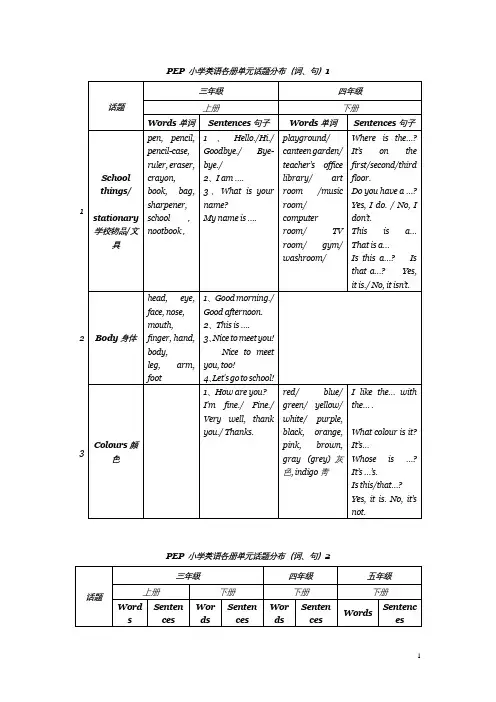
PEP 小学英语各册单元话题分布(词、句)1
1
PEP 小学英语各册单元话题分布(词、句)2
PEP 小学英语各册单元话题分布(词、句)3
PEP 小学英语各册单元话题分布(词、句)4
PEP 小学英语各册单元话题分布(词、句)5
PEP 小学英语各册单元话题分布(词、句)6
PEP 小学英语各册单元话题分布(词、句)7
11
PEP 小学英语各册单元话题分布(词、句)8
1
1
9
PEP
15
PEP 小学英语各册单元话题分布(词、句)10
16
17
PEP 小学英语各册单元话题分布(词、句)11
EP 小学英语各册单元话题分布(词、句)12
PEP 小学英语各册单元话题分布(词、句)14
感谢您的阅读,祝您生活愉快。

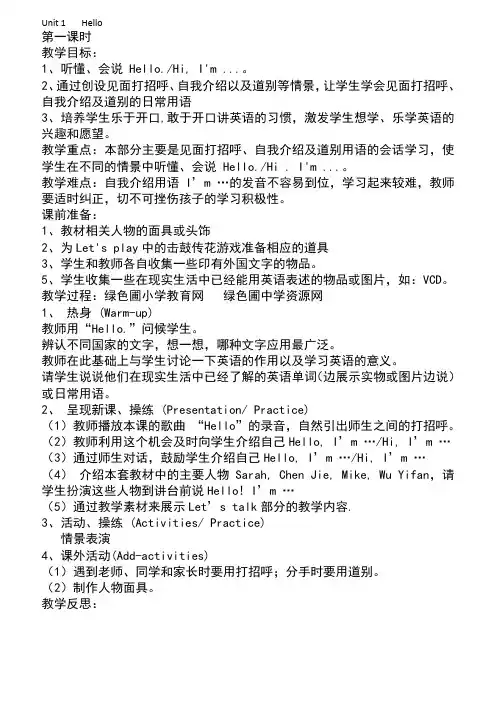
Unit 1 Hello第一课时教学目标:1、听懂、会说 Hello./Hi, I'm ...。
2、通过创设见面打招呼、自我介绍以及道别等情景,让学生学会见面打招呼、自我介绍及道别的日常用语3、培养学生乐于开口,敢于开口讲英语的习惯,激发学生想学、乐学英语的兴趣和愿望。
教学重点:本部分主要是见面打招呼、自我介绍及道别用语的会话学习,使学生在不同的情景中听懂、会说 Hello./Hi . I'm ...。
教学难点:自我介绍用语I’m …的发音不容易到位,学习起来较难,教师要适时纠正,切不可挫伤孩子的学习积极性。
课前准备:1、教材相关人物的面具或头饰2、为Let's play中的击鼓传花游戏准备相应的道具3、学生和教师各自收集一些印有外国文字的物品。
5、学生收集一些在现实生活中已经能用英语表述的物品或图片,如:VCD。
教学过程:绿色圃小学教育网绿色圃中学资源网1、热身 (Warm-up)教师用“Hello.”问候学生。
辨认不同国家的文字,想一想,哪种文字应用最广泛。
教师在此基础上与学生讨论一下英语的作用以及学习英语的意义。
请学生说说他们在现实生活中已经了解的英语单词(边展示实物或图片边说)或日常用语。
2、呈现新课、操练 (Presentation/ Practice)(1)教师播放本课的歌曲“Hello”的录音,自然引出师生之间的打招呼。
(2)教师利用这个机会及时向学生介绍自己Hello, I’m …/Hi, I’m …(3)通过师生对话,鼓励学生介绍自己Hello, I’m …/Hi, I’m …(4)介绍本套教材中的主要人物Sarah, Chen Jie, Mike, Wu Yifan,请学生扮演这些人物到讲台前说Hello! I’m …(5)通过教学素材来展示Let’s talk部分的教学内容.3、活动、操练 (Activities/ Practice)情景表演4、课外活动(Add-activities)(1)遇到老师、同学和家长时要用打招呼;分手时要用道别。
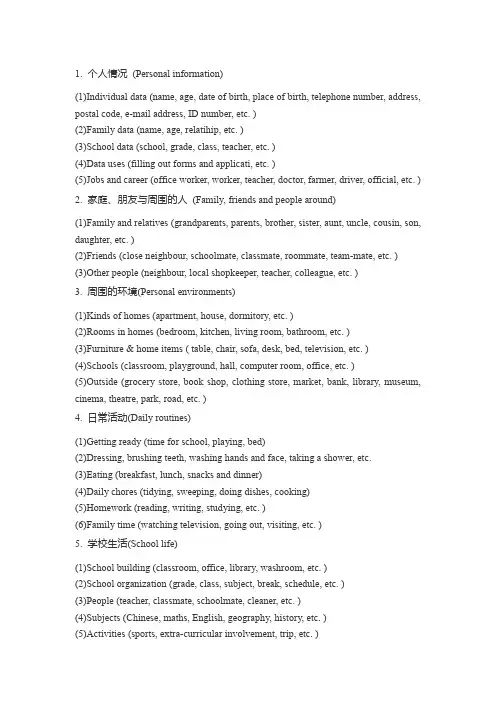
1. 个人情况(Personal information)(1)Individual data (name, age, date of birth, place of birth, telephone number, address, postal code, e-mail address, ID number, etc. )(2)Family data (name, age, relatihip, etc. )(3)School data (school, grade, class, teacher, etc. )(4)Data uses (filling out forms and applicati, etc. )(5)Jobs and career (office worker, worker, teacher, doctor, farmer, driver, official, etc. ) 2. 家庭、朋友与周围的人(Family, friends and people around)(1)Family and relatives (grandparents, parents, brother, sister, aunt, uncle, cousin, son, daughter, etc. )(2)Friends (close neighbour, schoolmate, classmate, roommate, team-mate, etc. )(3)Other people (neighbour, local shopkeeper, teacher, colleague, etc. )3. 周围的环境(Personal environments)(1)Kinds of homes (apartment, house, dormitory, etc. )(2)Rooms in homes (bedroom, kitchen, living room, bathroom, etc. )(3)Furniture & home items ( table, chair, sofa, desk, bed, television, etc. )(4)Schools (classroom, playground, hall, computer room, office, etc. )(5)Outside (grocery store, book shop, clothing store, market, bank, library, museum, cinema, theatre, park, road, etc. )4. 日常活动(Daily routines)(1)Getting ready (time for school, playing, bed)(2)Dressing, brushing teeth, washing hands and face, taking a shower, etc.(3)Eating (breakfast, lunch, snacks and dinner)(4)Daily chores (tidying, sweeping, doing dishes, cooking)(5)Homework (reading, writing, studying, etc. )(6)Family time (watching television, going out, visiting, etc. )5. 学校生活(School life)(1)School building (classroom, office, library, washroom, etc. )(2)School organization (grade, class, subject, break, schedule, etc. )(3)People (teacher, classmate, schoolmate, cleaner, etc. )(4)Subjects (Chinese, maths, English, geography, history, etc. )(5)Activities (sports, extra-curricular involvement, trip, etc. )(6)Instructi (Please listen, read, get into groups, act, etc. )(7)Educational methods (preview, review, discuss, presentation, summary)6. 兴趣与爱好(Interests and hobbies)(1)Less (music, dance, acting, sport, etc. )(2)Games (physical games, computer games, sports, etc. )(3)Hobbies (collecting stamps, coins, dolls, etc. )(4)Reading (books, newspapers, comics, etc. )(5)Cultural events (film, theatre, concert, opera, etc. )(6)Entertainment (listening to radio, watching TV, playing CD, DVD, etc. )(7)Socializing (having parties, issuing invitati, going for picnics, going sightseeing, entertaining guests, etc. )(8)Expressing your reacti to these activities7. 个人感情(Emoti)(1)Describing feelings (happy, sad, angry, upset, pleased, proud, lonely, worried, nervous, afraid, etc. )(2)Expressing emoti (smiling, laughing, crying, shouting, etc. )(3)Describing facial expressi and gestures8. 人际关系(Interpersonal relatihips)(1)People (parent, brother, sister, other family members, friend, neighbour, teacher, etc. )(2)Social behaviours (greeting, introducing, giving thanks, asking for permission, asking for help, solving problems, dealing with conflicts, etc. )(3)Getting together (making plans / arrangements, time, date, place, event, etc. )9. 计划与愿望(Plans and intenti)(1)Planning (holidays, social events, travel, further education, jobs, etc. )(2)Organising ( asking for advice, asking for help, asking for permission, exploring possibilities, expressing needs and wants, etc. )10. 节假日活动(Festivals, holidays and celebrati)(1)Cultural festivals ( Spring Festivals, New Year's Day, Christmas, etc. )(2)Religious holidays (Christmas, Easter, Ramada, etc. )(3)Personal celebrati (birthday, anniversary, graduation, etc. )11. 购物( Shopping)(1)Planning (shopping list, needs, wants, etc. )(2)Products (clothes, groceries, personal items, electronics, etc. )(3)Selecting (quality, weights, measures, size, colour, style, etc. )(4)Paying (price, quantity, etc. )12. 饮食(Food and drink)(1)Meats (beef, chicken, pork, fish, etc. )(2)Soups (chicken, tofu, vegetable, etc. )(3)Vegetables (cabbage, eggplant, etc. )(4)Staple food (rice, bread, noodles, cake)(5)Drinks (milk, water, juice, soft drink, coke, alcoholic drinks, beer, wine, etc. )(6)Fast foods ( sandwiches, noodles, dumplings, hot dogs, hamburgers, chips, etc. )(7)Snacks (ice cream, chips, etc. )(8)Eating customs (ways of eating, kinds of food, times to eat, table manners, chopsticks, knife, fork, etc. )(9)Requesting or offering different foods and drinks(10)Likes and dislikes (favourite food, favourite drinks, etc. )(11)Ordering food and/or drinks13. 健康(Health)(1)Eating habits(2)Physical fitness and exercise(3)Personal hygiene(4)Illnesses (stomachache, headache, flu, cold, etc. )(5)Medicati(6)Accidents(7)Doctors, nurses & hospitals(8)Describing problems (parts of the body, pains, etc. )(9)Medical insurance14. 天气(Weather)(1)Describing weather (sunny, cloudy, windy, rainy, hot, warm, cold, cool, etc. )(2)Extreme weather (storms, gales, hurricanes, etc. )(3)Dressing for the weather ( coat, hat, umbrella, raincoat, windbreaker, etc. )15. 文娱与体育(Entertainment and sports)(1)Movies and theatre(2)Music and dance (folk music and dance, popular music and classical music)(3)Team games (football, basketball, volleyball, etc. )(4)Games of two or four (table tennis, tennis, golf, etc. )(5)Racing (running, swimming, horse racing, etc. )(6)International sports events ( Olympic Games, World Cup, Football League, etc. )(7)Spectators and fans(8)Physical exercises16. 旅游和交通(Travel and transport)(1)Methods of transportation ( walking, cycling, horse riding, taking buses, trains, boats, planes)(2)Travel (schedules, maps, tickets, fares)(3)Getting and asking directi (left, right, straight ahead, north, south, east, west, etc. )(4)Safety rules and warnings (traffic lights, caution, walk, stop, etc. )(5)Inquiring and making reservati (hotels, tourist spots, etc, )(6)International travel (passport, visas, expenses, currency, etc. )(7)Describing a journey17. 语言学习(Language learning)(1)Differences between American English and British English(2)Language and culture(3)Language learning difficulties(4)Attitudes to language and communication(5)Language learning strategies(6)Communicati repair18. 自然(Nature)(1)Plants (green plants, trees, bushes, grass, vegetables, crops, flowers. etc. )(2)Animals (farm animals, wild animals, endangered animals, pets, etc. )(3)Heavenly bodies (The sun, the earth, the moon and stars, etc.)(4)Describing land (cities, farms, hill, mountains, lakes, rivers, etc. )(5)Natural disasters (V olcano,earthquake, etc. )19. 世界和环境(The world and the environment)(1)Countries and maps (China, Great Britain, United States, Australia, Canada, NewZealand, Japan, Russia, India, Egypt, Cuba. etc. )(2)Issues (pollution, land use and quality, population growth, housing, etc. )20. 科普知识与现代技术(Popular science and modern technology)(1)Recent inventi, medical advances, technological advances, etc.(2)Computer science21. 热点话题(Topical issues)(1)Population(2)Environmental cervation(3)Crime and punishment(4)Social differences(5)Pollution22. 历史和地理( History and geography)(1)General knowledge of history and geography about China(2)General knowledge of history and geography about the world(3)Historic events(4)Historical pers23. 社会(Society)(1)Nationality and people(2)Famous people (contemporary)(3)Law (rules and regulati, traffic codes)(4)Ways of dressing (types of clothes, daily clothes or dress, situation and dressing)(5)Names of religi(6)Religi and culture(7)Customs and culture24. 文学与艺术(Literature and art)(1)Forms of literature and art (play, drama, novel, essay, poetry, short story)(2)Famous literary people and artists。
新人教版PEP五年级英语上册各单元重点知识归纳Unit 1: Hello!- Greetings: Hello, Hi, Good morning, Goodbye- Introducing oneself: My name is..., I'm..., Nice to meet you- Numbers: 1-20- Classroom objects: desk, chair, book, pen, pencil, rulerUnit 2: My Schoolbag- Stationery items: eraser, pencil sharpener, glue, crayons, scissors - Colors: red, blue, green, yellow, black, white- Personal pronouns: I, you- Plural forms of nouns: pens, pencils, rulers, booksUnit 3: My Friends- Adjectives: happy, sad, tall, short, thin, fat- Describing appearance: He/She is..., They are...- Possessive adjectives: my, your, his, her, their- Talking about friends: I have a friend. His/Her name is... Unit 4: My Home- Rooms in a house: living room, bedroom, kitchen, bathroom - Prepositions: in, on, under, near- Furniture: sofa, bed, table, chair- Demonstrative pronouns: this, that, these, thoseUnit 5: Food and Drinks- Food items: apple, banana, orange, sandwich, hamburger- Drinks: water, milk, juice, tea- Expressing likes and dislikes: I like..., I don't like...- Question words: What, Where, WhoUnit 6: At the Market- Fruit: grapes, strawberries, watermelon, pineapple- Vegetables: carrot, tomato, onion, potato- Countable and uncountable nouns: an apple, some bananas, a glass of milk- Shopping phrases: How much is..., I want...Unit 7: In the Park- Outdoor activities: play football, fly a kite, ride a bicycle- Weather: sunny, rainy, windy- Present continuous tense: I am playing, He is running- Adverbs: slowly, quicklyUnit 8: My Family- Family members: father, mother, brother, sister- Describing relationships: This is my..., He/She is my...- Possessive 's: Dad's book, Mom's bag- Expressing family activities: We have dinner, We go swimmingUnit 9: At the Zoo- Animals: panda, lion, elephant, giraffe, monkey, tiger- Describing animals: big, small, tall, short, fast, slow- Present simple tense: Lions eat meat, Monkeys swing on trees - Plural forms of animals: pandas, monkeys, tigersUnit 10: At the Farm- Farm animals: cow, horse, pig, chicken, goat- Animal sounds: moo, neigh, oink, cluck, baa- Expressing abilities: I can..., He/She can...- Prepositions of location: in front of, behindUnit 11: Nature Park- Nature elements: river, tree, flower, grass, mountain- Adverbs of frequency: always, usually, sometimes, never- Asking about preferences: Do you like..., Which do you like...Unit 12: Let's Celebrate!- Festivals: Christmas, Spring Festival, Easter, Halloween- Activities during festivals: decorate, light candles, give gifts - Recounting past events: Last year, I..., We...。